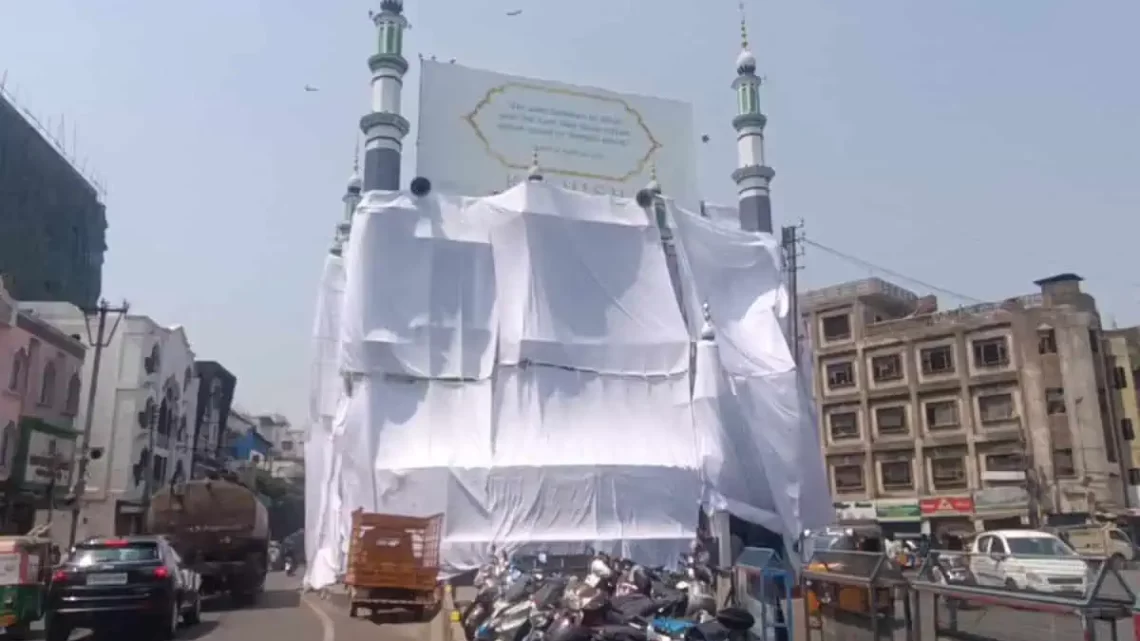
BJP MLA T Raja Singh Defies Police Orders, Organizes Controversial Ram Navami Rally
April 19, 2024Against the orders of the Hyderabad Police, BJP MLA T Raja Singh, known for his controversial track record, led a large Ram Navami rally on Wednesday. Despite having over 100 cases of hate speeches registered against him, Singh orchestrated the procession, flouting police refusal and accusations against the Congress government.
Singh’s rally, starting from the Akashpuri Hanuman Temple to Hanuman Vyamshala in RamKoti, garnered attention for all the wrong reasons. Donning saffron attire and a turban embellished with a Ram Temple image, Singh commenced the event with temple prayers, surrounded by armed guards forming a protective ring.
The procession, marked by provocative actions, including covering mosques along the route and Singh’s halts to address his followers, drew controversy. One mosque in Siddiamber Bazar was notably covered with a white cloth, as depicted in viral pictures. Despite the police’s denial of permission, Singh pressed on, claiming that his application had been submitted nearly 40-42 days earlier.
Singh’s history of incendiary behavior, encompassing Islamophobic songs, cow vigilantism, and hate speeches, has resulted in his detention under the Preventive Detention Act, facing numerous cases related to hate speech. Even last year, he violated bail conditions by advocating for the establishment of an ‘Akhand Hindu Rashtra’, defying the Telangana High Court’s orders.
During the rally, Singh’s rhetoric escalated as he called for India to be declared a Hindu country, echoing sentiments of forming an ‘Akhand Hindu Rashtra’. His inflammatory remarks targeted leaders opposed to his vision, challenging the existence of Islamic and Christian-majority nations.
The presence of a large portrait of Nathuram Godse, the assassin of Mahatma Gandhi, among Singh’s followers, added another layer of controversy. Singh urged the crowd to take an oath towards the establishment of an ‘Akhand Hindu Rashtra’, combatting ‘love jihad’, preventing cow slaughter, and resisting religious conversions.
‘Love jihad’, a term propagated by Hindu right-wing groups, alleges that Muslim men coerce Hindu women into conversion through romantic relationships. Despite lacking evidence, it remains a contentious issue perpetuated by such groups.
Singh’s actions not only defy legal boundaries but also exacerbate communal tensions. By flouting court orders and police directives, he perpetuates a narrative of divisiveness, posing a threat to India’s secular fabric. His rhetoric not only polarizes communities but also undermines the principles of harmony and coexistence.
In a diverse nation like India, embracing pluralism and respecting religious freedoms is imperative for social cohesion. Political leaders must prioritize inclusivity and dialogue over divisive agendas that sow seeds of discord.
As Singh continues to court controversy with his inflammatory rhetoric and actions, it underscores the importance of upholding the rule of law and promoting unity in diversity. The onus lies on both the political leadership and civil society to condemn such divisive narratives and work towards fostering a more inclusive and harmonious society.

